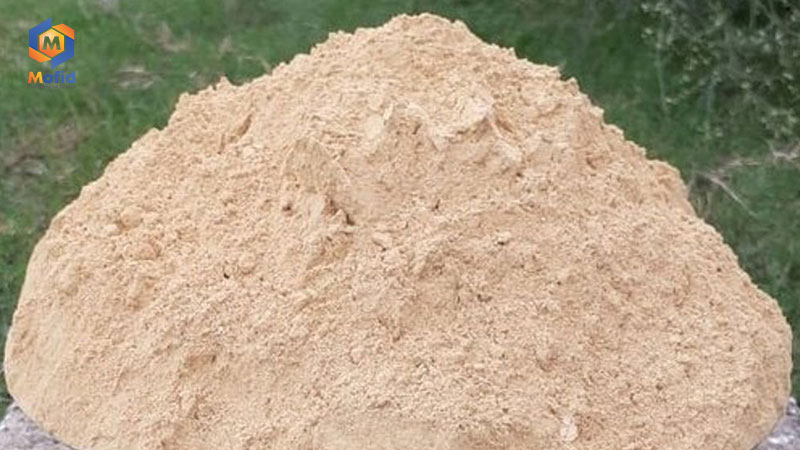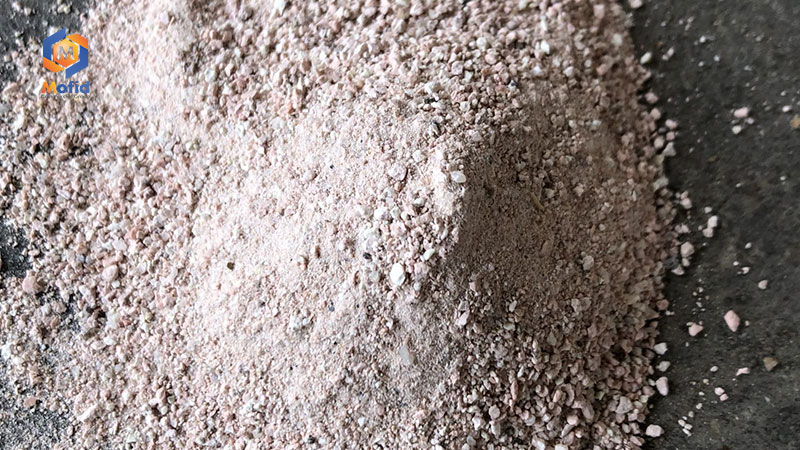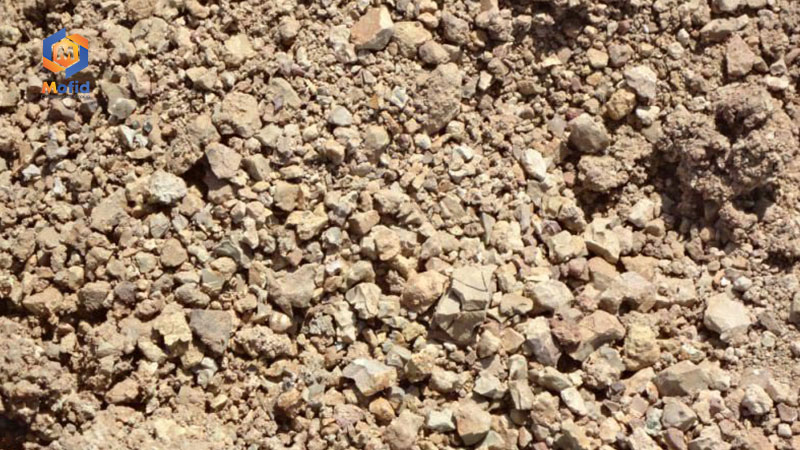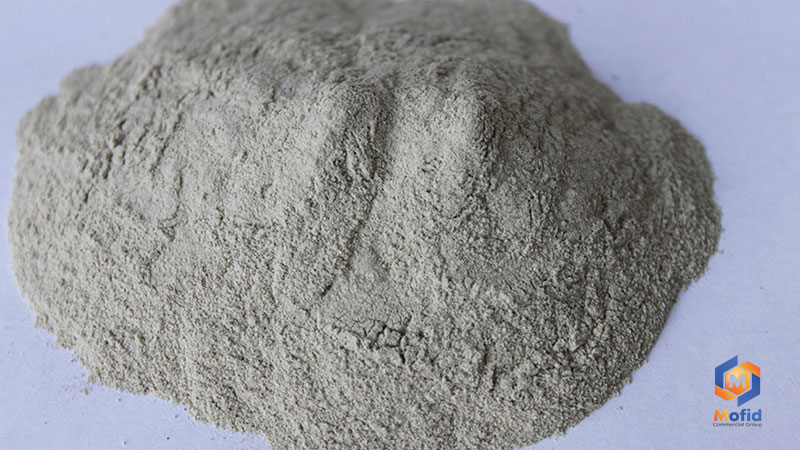Bentonite is a mineral substance from the family of clays or clay-like materials. Sodium bentonite is one of the common types of natural bentonite that can be extracted from mines in various parts of the world. Alongside the extraction of sodium bentonite, other types, such as calcium bentonite and potassium bentonite, also exist in veins, but the range of applications for sodium bentonite is much broader. In the following, we will discuss this type of bentonite in more detail.
What is Sodium Bentonite?
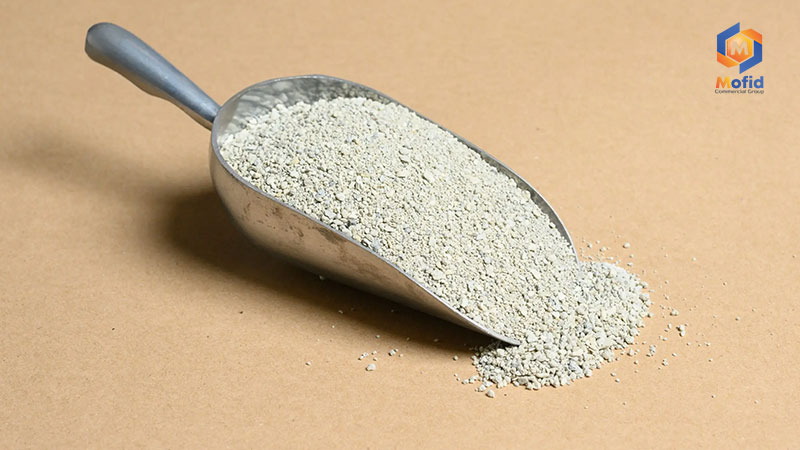
Bentonite is a soft mineral substance from the family of clays or clay-like materials. This mineral consists of swelling minerals, primarily montmorillonite, which belongs to the smectite group. This group of minerals forms through weathering in dry climates and appears in colors such as white, cream, or yellow based on the impurities in its structure. Their characteristics include ion exchange, plasticity, and ionic expansion and contraction. Generally, bentonites are divided into two major groups:
- Swelling bentonites or sodium bentonites
- Non-swelling bentonites or calcium bentonites
Sodium bentonite is stronger than calcium bentonite in terms of ion absorption, plasticity, and expansion and contraction. The range of applications for sodium bentonite is much broader than other types, including calcium and potassium bentonites. According to the Lonestarbarite website regarding the uses of this type of bentonite:
Sodium Bentonite Clay is an effective pond sealant, an anti-odor agent for cat litter, a cleansing agent in wastewater treatment, a clumping agent for metal casting green sand, and an environmentally friendly drilling mud additive.
It is noteworthy that if needed, calcium bentonite can be converted into sodium bentonite with the help of chemicals such as caustic soda. The product resulting from this process is called synthetic sodium bentonite. Sodium and calcium bentonites differ in structure and application. For instance, sodium bentonite has stronger electrical conductivity compared to calcium bentonite.
As mentioned, sodium bentonite has a high water absorption capacity and is swelling, while calcium bentonite is capable of absorbing ions and toxins.
Production of Sodium Bentonite
Sodium bentonite is a mineral bentonite that can be extracted from mines in many parts of the world. Alongside the extraction of sodium bentonite, other types, such as calcium and potassium bentonites, also exist in veins. However, the range of applications for sodium bentonite is much broader. Since various industries require sodium bentonite far more than other types, if its extraction is insufficient, calcium bentonite can be converted into sodium bentonite using chemicals such as caustic soda, producing synthetic sodium bentonite.
Applications of Sodium Bentonite
The uses of sodium bentonite as a valuable and yet inexpensive mineral are extensive. As mentioned, sodium bentonite is a natural adhesive. Its main feature is its ability to absorb water and expand up to 15 times its dry weight. It is used in various industries, such as construction, agriculture, petrochemicals, and metal casting.
Advantages of Sodium Bentonite in Agriculture
- Saving water in agriculture due to its water absorption and long-term retention capabilities, preventing water loss
- Use in the production of herbicides and insecticides
- Controlling pH levels in saline soils
- Absorbing moisture in silos and preventing mold growth, especially in humid areas
- Ability to combine with sulfur to produce sulfur bentonite fertilizer
- Providing a suitable substrate for greenhouse cultivation and landscaping
- Improving soil structure with agricultural bentonite
Applications of Sodium Bentonite in Animal Husbandry
- Improving feed conversion rates and weight gain in livestock
- Reducing rumen ammonia nitrogen
- Enhancing the quantity and quality of milk with livestock feed bentonite
- Absorbing excess moisture in bedding and reducing harmful fungal growth
- Detoxifying the digestive system of animals
- Pelletizing and granulating animal feed
The Role of Sodium Bentonite in Drilling Oil Wells
- Creating a gel-like and impermeable compound by absorbing water
- Blocking water flow pores in its structure and sealing wells
- Providing proper and suitable wall coverage in drilling areas
- Preventing sludge and waste accumulation on well walls
- Assisting in lubricating drill bits and reducing friction with its slippery properties
The Advantages of Sodium Bentonite in Earthing Wells
- Creating a strong layer with low electrical resistance around electrodes
- Eliminating the need for deep well digging with earthing bentonite
- Protecting electrodes from erosion and sulfation
- Maintaining stable electrical resistance over time
- Easy application at a lower cost compared to traditional methods
The Role of Sodium Bentonite in Metal Casting
- Forming a bond between sand and other materials in casting molds
- Increasing strength and thermal capacity in iron and steel casting
- Enhancing dimensional accuracy and heat resistance in casting
- Preventing moisture penetration into cracks and seams
Applications of Sodium Bentonite in Construction
- Preventing wall collapses by creating hydrostatic pressure and supporting drilling
- Not flowing in the drilling area due to its adhesive-like properties
- Not reacting or combining with cement in the concrete setting process with construction bentonite
- Creating a protective layer on surfaces and sealing unwanted gaps and pores
Price of Sodium Bentonite
The price of sodium bentonite is determined based on the mineral’s purity, absorption rate, and the required mesh size for its application. Considering the potential for price changes due to labor costs, extraction expenses, and transportation from Iranian bentonite mines, contact the sales department of the “Mofid” collection for the latest price of sodium bentonite.
Buying Sodium Bentonite
Certainly, purchasing sodium bentonite from a reliable and trusted source or manufacturer is the best option for obtaining the product at a fair price. The “Mofid” collection produces various types of bentonites, such as drilling bentonite, edible bentonite, and high-quality sodium bentonite with excellent absorption capacity. It is ready to sell its products to customers across the country through its website. If you need consultation regarding this product, fill out and submit the consultation and sales form. For product analysis, sample requests, and placing an order, contact the business department via the numbers listed on the website.
Conclusion
As the most widely used type of bentonite, sodium bentonite is utilized in numerous industries, including agriculture, animal husbandry, poultry farming, oil well drilling, earthing well digging, and metal casting. The dominant element in this mineral is sodium, and its most important characteristic is its high water absorption and retention capacity. The price of sodium bentonite is also estimated based on this factor.
FAQs
1. What is sodium bentonite?
Sodium bentonite is a mineral substance that can be extracted from numerous bentonite mines in Iran. The range of applications for sodium bentonite is much broader than other types, such as calcium and potassium bentonites.
2. What are the uses of sodium bentonite in agriculture?
Saving water in agriculture due to its water absorption and long-term retention capabilities, controlling pH in saline soils, combining with sulfur to produce sulfur bentonite fertilizer, improving soil structure, and using it in the production of herbicides and insecticides are among the uses of sodium bentonite in agriculture.

